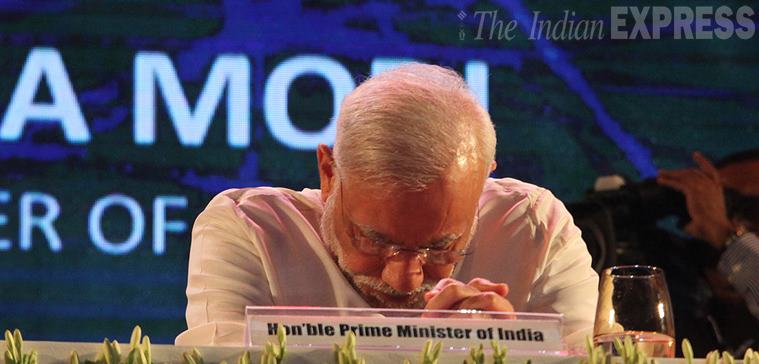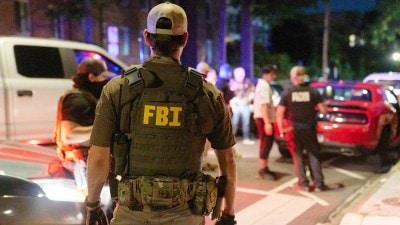PM Narendra Modi owes it to us to ‘hold aloft the torch of freedom’
In lamenting PM Modi’s dilemma (damned if he does and equally damned if he doesn’t), Chandan Mitra, in classic propagandist fashion, first provides us with a cleansed version of what happened to Mohammad and Danish Akhlaq in Uttar Pradesh. A rejoinder is necessary.
 Prime Minister Narendra Modi in this file photo. Express Photo/Anil Sharma
Prime Minister Narendra Modi in this file photo. Express Photo/Anil Sharma
George Santayana famously argued that “those who do not remember the past are condemned to repeat it”. Its seems that protagonists tend to forget the very histories they weave. In October 2012, the Bhartiya Janta Party (BJP)’s then prime ministerial candidate Narendra Modi sarcastically quipped “aaj ki sabse badi khabar hain ki Maun Mohan Singh ne apne maun tod diya” (today’s biggest news is that ‘Maun Mohan’ Singh broke his silence). That cleverly worded comment evoked considerable mirth across India then, but as Shakespeare put it, “the wheel has come full circle”. Today, on a number of important issues, Prime Minister ‘Maun-di’ is ominously silent.
Recently, Chandan Mitra speciously tried to defend the Prime Minister’s silence (“Stop Looking for a Modi Apology”, NDTV), to which a rejoinder is necessary. Mitra’s article is a textbook example of obfuscatory clarifications (to specifically put PM Modi in the clear). In lamenting the PM’s dilemma (damned if he does and equally damned if he doesn’t), Mitra, in classic propagandist fashion, first provides us with a cleansed version of what happened to Mohammad and Danish Akhlaq in Uttar Pradesh. He argues that the lynching was the “individual act of a misguided mob”. He conveniently obfuscates three key issues. First, this 200-strong mob of Hindus was instigated by a call from the loudspeaker of the village temple. Who was responsible for that instigation (or would it be more accurate to characterise it as deliberate mobilisation)? Second, the mob was instigated by a rumour that the Akhlaq’s were storing and consuming cow meat. Who spread that rumour? And finally, which party is currently spearheading cow slaughter bans across various states and routinely polarising communities on the eve of elections? No prizes for guessing the correct answer!
It is the Sangh Parivar that is directly responsible for creating and fostering an environment of communal hatred. Key BJP and Sangh leaders have gone on record to claim that Muslims are not a minority (Najma Heptullah, who’s ironically a Muslim and the Minority Affairs Minister), and that India will be homogenised into a Hindu rashtra (Mohan Bhagwat and Goa’s Deputy CM Francis D’Souza), something that Sardar Patel, who the BJP has tried using instrumentally, characterised as a “mad idea”. Ever since the Muzaffarnagar riots, the Sangh has been engineering communal violence for electoral gains. Immediately after the general elections, close to 400 communal riots were engineered in UP in areas that were headed for by-polls. Riots were again engineered in Vadodara and Delhi’s Trilokpuri (again, ahead of by-elections). Similarly, Cobrapost and Gulail’s meticulous sting has revealed how RSS and BJP leaders have instrumentally used the concepts of “love-jihad” to whip up communal sentiments (“ghar-wapsi” also falls in this category). It is this politics of intolerance that is responsible both for the vicious attacks on writers and rationalists and for inciting the mob that lynched the Akhlaqs.
This is bound to be misinterpreted so a clarification is necessary here. In attacking the Sangh and the BJP, this author is not attacking Hindus. In fact, the vast majority of Indians believe in and follow ‘Sarva Dharma Sambhava’ or the equality of all religions, which is something both the Sangh and the BJP are opposed to. To put it plainly, the RSS is to Hinduism what the Ku Klux clan is to Christianity and ISIS is to Islam.
Reverting back to Mitra, in Gobblesian fashion, he then goes on to attack the media. He posits that these issues are being raised only by “a section of the media, that has gunned for Modi ever since the…riots of 2002 and was shell-shocked by the scale of his electoral victory in 2014, (and is therefore) still hunting for an issue with which to nail the Prime Minister”! Apart from his deplorable sycophancy, what’s really shocking is how Mitra audaciously overlooks the legitimacy of the issues raised. It is also unfortunate to note how he callously brackets the media as insincere and prejudiced. But then again, he is from the BJP, which has purposefully stifled freedom of expression and speech (remember the restrictions on NGOs, the beef and porn bans, among other things?).
Mitra also argues, in what is way past the incredulous, that “secular fundamentalists”, “fattened by years of Congress dole” who have “feigned outrage”, “act in ways to instigate strife” to discredit the PM internationally. Does Mitra genuinely believe that this ‘strife’ was created by the very citizens who protest against these atrocities? And is he (and the BJP) more concerned about protecting the PM’s international image, rather than resolving issues that affect ordinary Indians?
Furthermore, in bringing the Congress party into this issue, Mitra calculatingly politicises the issue (hoping that in doing so, any anti-Congress sentiment will obscure the real issues in question). He conveniently ignores that numerous civil society organisations and citizens who have consistently raised their voices against government excesses in India, regardless of which political party they belong to, and regardless of the community of either the perpetrator or the victim. In this, Mitra is guilty of whitewashing any dissent of the government as illegitimate.
For nine days, PM Modi consistently engaged in the routine and mundane (even wishing people on their birthdays) and completely ignored a dastardly lynching! Even if one ignores Mitra’s ridiculous characterisation of the PM’s silence as ‘stoic’, what really hurts the sensibilities of any conscientious person is how a democratically elected leader, who professes to speak for every citizen, can be indifferent for so long. Do these issues not prick the PM’s conscience? Or was he so busy that he simply couldn’t find time to compose one statement on the issue, let alone visit the place in question? But Mitra overlooks this too.
Mitra then contends that PM Modi is not addressing this issue because a) if he does, the above mentioned ‘secularist fundamentalists’ would implicate him and b) once that is implied, skeletons of the 2002 riots will tumble out. Essentially, what Mitra is insinuating is that the PM should not say or do the right thing because it may bring up a tainted past. Firstly, is Mitra insinuating that Modi was actually responsible for 2002, and hence needs to (for political expediency) whitewash the past? And secondly, assuming PM Modi is not responsible for 2002, will the fear of the past continue to guide all his future engagements on similar issues? We elected the PM to lead the country, not scamper from his responsibilities, however tough they may be for him personally. As Lincoln once said, “you cannot escape the responsibility of tomorrow by evading it today”.
Mitra also asserts that President Pranab Mukherjee’s speech offered an opening for the PM to speak on the issue. Since when has doing the right thing been premised on the opportune moment (in this case, the President’s speech)? If the PM was looking for a moral yardstick to articulate his concerns (which is what Mitra implies), he had to look no further than the Constitution of India (specifically, articles 25, 26 and 27). In fact, the BJP would do well to remember that it is only the Constitution that defines the political culture and collective conscience of India, not the Sangh’s texts.
Contrary to what Mitra has argued, the Prime Minister is deemed responsible for anything that threatens the political culture of India. Command responsibility for the incident may not vest with him directly, but as the Prime Minister, he (and his government) have to uphold and defend Constitutional norms, something they have not done so far. Gandhi showed us that we have it in us to be a compassionate and responsible society, something that is being undone by the Sangh now. Given his vantage position, Prime Minister Modi can stop them, and appeal to the collective conscience of the nation. Taking from what Nehru said, he owes it to us to “hold aloft the torch of freedom…(and to) light up the darkness that surrounds us”.
– The author is an analyst with the Congress party. Views expressed by the author are personal.
Photos


- 01
- 02
- 03
- 04
- 05




























